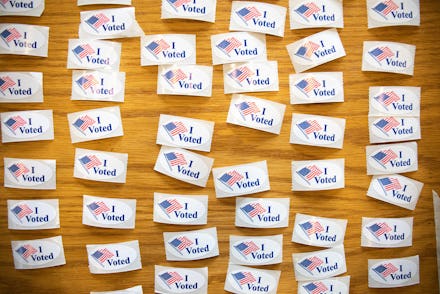A woman in North Carolina faces 3 years in prison for voting while on probation

A law that originated during Jim Crow to disenfranchise voters is still on the books, and now it's threatening a North Carolina woman with jail time. Years after Lanisha Bratcher was initially arrested for voting while on probation, prosecutors are now bringing new charges of voter fraud against her that could land her behind bars for more than three years.
Bratcher was previously convicted on a felony charge of assault. She voted in the 2016 presidential election, believing that she had served the full term of her sentence. But at the time she was still on probation, and state law dictates that people convicted on felony charges who are still serving a portion of their sentence, including parole or probation, are ineligible to vote.
Bratcher said that she didn't realize she was ineligible to vote. But a prosecutor said that it didn't matter if Bratcher knew she was breaking the law or not — it only mattered that she illegally cast a ballot. In North Carolina, voter fraud typically incurs a felony charge, but in June the district attorney of Hoke County, where Bratcher voted in 2016, decided to change her strategy against Bratcher: She dropped the felony charge and instead brought two grand jury indictments against Bratcher.
In doing so, the district attorney was able to "double" the charges against Bratcher, The Guardian reported. The first felony charge came with up to 19 months in prison; now, each of the two new counts come with a maximum of 19 months behind bars.
The district attorney's office argues that because Bratcher declared on both her voter registration form and early voting ballot that she was eligible to vote, Bratcher lied, which the state refers to as providing false testimony. (Again, Bratcher did not know that being on probation prohibited her from voting.) Bratcher's lawyer hypothesized that the prosecutor may be attempting to make an example of Bratcher — or worse, scare off other potential voters who may be nervous to cast a ballot if they have prior convictions. "It feels like in some ways [Bratcher is] being punished or targeted for fighting back,” said John Carella, Bratcher’s lawyer, according to The Guardian.
"At the end of 2016, African Americans made up about 46% of convicted felons on parole or probation in the state. They made up about 22% of all registered voters."
The Guardian, which originally reported on Bratcher's case, said that in 2016, investigators from the North Carolina Board of Elections actually wrote to the district attorney prosecuting Bratcher and argued that most illegal voting by those with felony criminal convictions should be forgiven because people are rarely informed of the law.
Still, prosecutors across North Carolina are able to use their discretion in deciding which voter fraud cases to pursue. The Guardian found that in many cases after the 2016 election, prosecutors chose not to prosecute some individuals, while levying serious and seemingly disproportionate charges against others, like Bratcher. Of the 441 people investigated for potentially voting improperly after a felony conviction, about 68% of them were Black, The Guardian found. The outlet did note additionally that "at the end of 2016, African Americans made up about 46% of convicted felons on parole or probation in the state. They made up about 22% of all registered voters."
Bratcher's story echoes that of Crystal Mason in Texas, who was sentenced to five years in jail for casting a provisional ballot on supervised release. Mason had a previous federal conviction for fraud, and specifically asked a poll worker about her eligibility before being advised to cast a provisional ballot — which are explicitly intended for people who are unsure of their voting status to be able to register their choice. Meanwhile, in the 2016 and 2018 elections, two white women were given probationary sentences for purposefully and intentionally engaging in voter fraud.
It seems ironic to advocates that those who are attempting to exercise their right to vote are sentenced to jail, which in turn further limits enfranchisement and democratic participation. But scholars note that systems of voting and voter participation have been designed this way; most states still believe voting is a privilege afforded to those who do not interact with the criminal-legal system.
According to the American Civil Liberties Union, nearly 5.8 million would-be voters across the country cannot vote because of state laws preventing those with felony convictions from casting a ballot. In 48 out of 50 states, people with felony convictions are denied the vote in some way upon release from jail. In three states — Iowa, Kentucky, and Virginia — those with felony convictions lose their right to vote forever.
In only two states — Vermont and Maine — everyone, no matter their history of conviction, retains the right to vote. In recent years, however, some progress has been made: In 2019, Kentucky Gov. Andy Beshear (D) signed an executive order to restore voting rights for those with non-violent convictions if they had completed their sentences, and in 2018, voters in Florida passed Amendment 4, which restored voting rights to more than 1 million disenfranchised Floridians who'd had previous convictions.